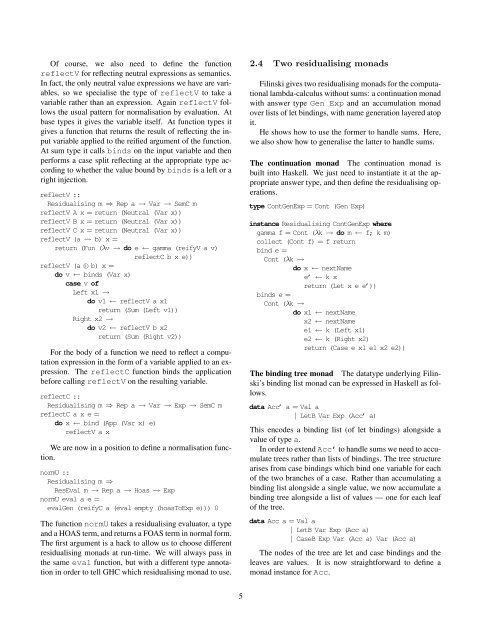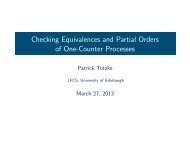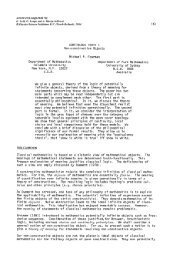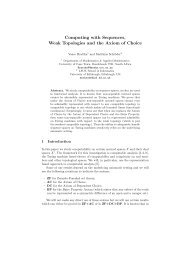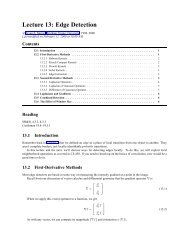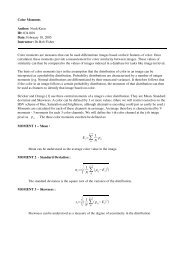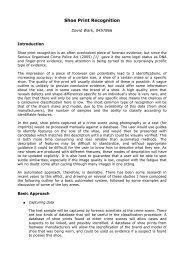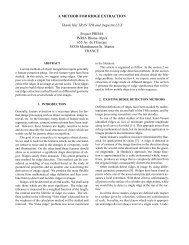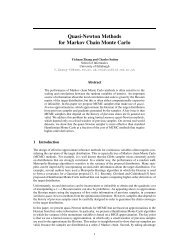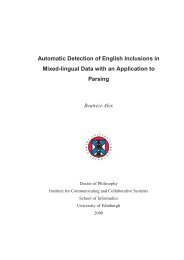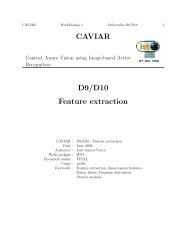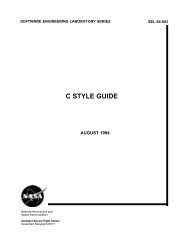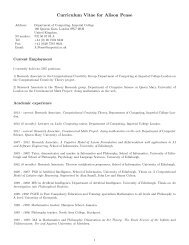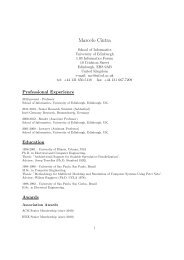Accumulating bindings - University of Edinburgh
Accumulating bindings - University of Edinburgh
Accumulating bindings - University of Edinburgh
Create successful ePaper yourself
Turn your PDF publications into a flip-book with our unique Google optimized e-Paper software.
Of course, we also need to define the function<br />
reflectV for reflecting neutral expressions as semantics.<br />
In fact, the only neutral value expressions we have are variables,<br />
so we specialise the type <strong>of</strong> reflectV to take a<br />
variable rather than an expression. Again reflectV follows<br />
the usual pattern for normalisation by evaluation. At<br />
base types it gives the variable itself. At function types it<br />
gives a function that returns the result <strong>of</strong> reflecting the input<br />
variable applied to the reified argument <strong>of</strong> the function.<br />
At sum type it calls binds on the input variable and then<br />
performs a case split reflecting at the appropriate type according<br />
to whether the value bound by binds is a left or a<br />
right injection.<br />
reflectV ::<br />
Residualising m ⇒ Rep a → Var → SemC m<br />
reflectV A x = return (Neutral (Var x))<br />
reflectV B x = return (Neutral (Var x))<br />
reflectV C x = return (Neutral (Var x))<br />
reflectV (a b) x =<br />
return (Fun (λv → do e ← gamma (reifyV a v)<br />
reflectC b x e))<br />
reflectV (a ⊕ b) x =<br />
do v ← binds (Var x)<br />
case v <strong>of</strong><br />
Left x1 →<br />
do v1 ← reflectV a x1<br />
return (Sum (Left v1))<br />
Right x2 →<br />
do v2 ← reflectV b x2<br />
return (Sum (Right v2))<br />
For the body <strong>of</strong> a function we need to reflect a computation<br />
expression in the form <strong>of</strong> a variable applied to an expression.<br />
The reflectC function binds the application<br />
before calling reflectV on the resulting variable.<br />
reflectC ::<br />
Residualising m ⇒ Rep a → Var → Exp → SemC m<br />
reflectC a x e =<br />
do x ← bind (App (Var x) e)<br />
reflectV a x<br />
We are now in a position to define a normalisation function.<br />
normU ::<br />
Residualising m ⇒<br />
ResEval m → Rep a → Hoas → Exp<br />
normU eval a e =<br />
evalGen (reifyC a (eval empty (hoasToExp e))) 0<br />
The function normU takes a residualising evaluator, a type<br />
and a HOAS term, and returns a FOAS term in normal form.<br />
The first argument is a hack to allow us to choose different<br />
residualising monads at run-time. We will always pass in<br />
the same eval function, but with a different type annotation<br />
in order to tell GHC which residualising monad to use.<br />
2.4 Two residualising monads<br />
Filinski gives two residualising monads for the computational<br />
lambda-calculus without sums: a continuation monad<br />
with answer type Gen Exp and an accumulation monad<br />
over lists <strong>of</strong> let <strong>bindings</strong>, with name generation layered atop<br />
it.<br />
He shows how to use the former to handle sums. Here,<br />
we also show how to generalise the latter to handle sums.<br />
The continuation monad The continuation monad is<br />
built into Haskell. We just need to instantiate it at the appropriate<br />
answer type, and then define the residualising operations.<br />
type ContGenExp = Cont (Gen Exp)<br />
instance Residualising ContGenExp where<br />
gamma f = Cont (λk → do m ← f; k m)<br />
collect (Cont f) = f return<br />
bind e =<br />
Cont (λk →<br />
do x ← nextName<br />
e’ ← k x<br />
return (Let x e e’))<br />
binds e =<br />
Cont (λk →<br />
do x1 ← nextName<br />
x2 ← nextName<br />
e1 ← k (Left x1)<br />
e2 ← k (Right x2)<br />
return (Case e x1 e1 x2 e2))<br />
The binding tree monad The datatype underlying Filinski’s<br />
binding list monad can be expressed in Haskell as follows.<br />
data Acc’ a = Val a<br />
| LetB Var Exp (Acc’ a)<br />
This encodes a binding list (<strong>of</strong> let <strong>bindings</strong>) alongside a<br />
value <strong>of</strong> type a.<br />
In order to extend Acc’ to handle sums we need to accumulate<br />
trees rather than lists <strong>of</strong> <strong>bindings</strong>. The tree structure<br />
arises from case <strong>bindings</strong> which bind one variable for each<br />
<strong>of</strong> the two branches <strong>of</strong> a case. Rather than accumulating a<br />
binding list alongside a single value, we now accumulate a<br />
binding tree alongside a list <strong>of</strong> values — one for each leaf<br />
<strong>of</strong> the tree.<br />
data Acc a = Val a<br />
| LetB Var Exp (Acc a)<br />
| CaseB Exp Var (Acc a) Var (Acc a)<br />
The nodes <strong>of</strong> the tree are let and case <strong>bindings</strong> and the<br />
leaves are values. It is now straightforward to define a<br />
monad instance for Acc.<br />
5


